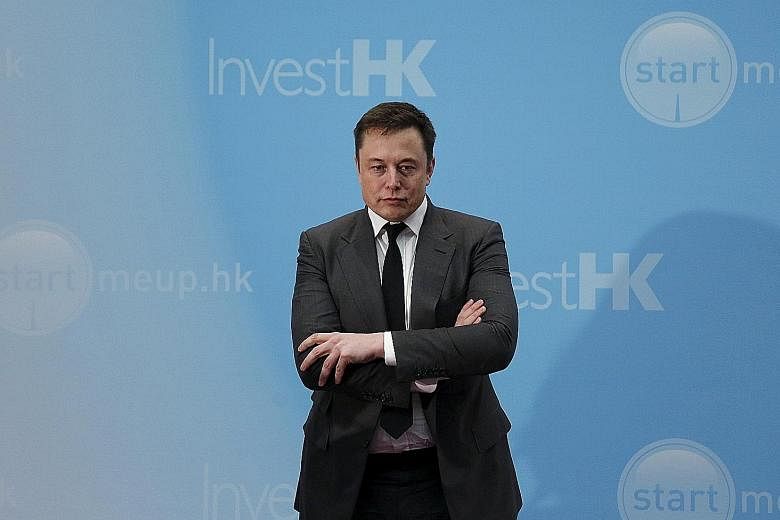DETROIT • As the co-founder and chief executive of Tesla Motors, technology billionaire Elon Musk has consistently portrayed his company's electric cars as cleaner, safer and more innovative than models made by other automakers.
His confidence in Tesla's technology has seemed boundless, particularly when the company announced last year that it would equip its flagship Model S sedans with a self-driving feature called Autopilot that was still in its testing phase.
The technology was so out in front of federal highway regulations that there were no rules against it.
But with the revelation last week that a Model S driver in Florida was killed in May while operating his car in self-driving mode, Mr Musk's determination to push limits has hit its most formidable roadblock.
The question now is how much longer Mr Musk and Tesla can continue to defy auto industry convention in trying to stay so far ahead of the competition. A major point of contention is the Autopilot feature and the decision to make it available to car owners while it was in "beta test" mode - a term typically applied to software that a company releases on an experimental basis.
"I can't think of another example of anything like this delivered in a beta phase in the automotive world," said Mr Ron Montoya, an analyst with auto research firm Edmunds.com. "Everything is tested up and down before it comes out."
Even some Tesla owners, many of whom can be cultishly devoted to the brand, question whether the self-driving technology is as safe as advertised.
"It gives you a false sense of security," said Mr Pete Cordaro, a Model S owner who used Autopilot in a loaner when his Tesla vehicle was being repaired. "You get comfortable and think you can take your hands off the wheel, but you really can't."
The death in May of Mr Joshua Brown, 40, of Canton, Ohio, was the first known fatality in a vehicle being operated by computer systems.
Auto industry executives and analysts wondered aloud whether Tesla had miscalculated by introducing a self-driving feature that was perhaps not ready to live up to Mr Musk's pronouncements.
In April, he told a conference in Norway: "The probability of having an accident is 50 per cent lower if you have Autopilot on."
Tesla declined to comment, but critics were not so reticent.
"They've always had this attitude of invincibility and perhaps promising more than their cars can deliver," said Mr Joseph Phillippi, president of consulting firm Auto- Trends. "But what can they say about a self-driving car that drove straight into a tractor-trailer?"
After minor recalls on Tesla cars this year, the company's quality controls were already being called into question, as was Mr Musk's ability to adequately oversee Tesla while pursuing other grand plans that include a proposal two weeks ago to merge the company with his solar energy company, SolarCity.
Other automakers and technology companies at work on self-driving vehicles that are years away from the commercial market expressed concerns that the Florida death could cast a pall over their field - and even prompt federal regulators to rush to write restrictive rules on the technology before any of their cars even take to the road. Executives at the rival companies declined to comment publicly.
But Mr Phillippi noted that most car companies had already tempered expectations and predicted a conservative timetable for the availability of self-driving vehicles.
"You talk to the traditional automakers, and they say we are five years away from being able to let go of the wheel and the car will drive itself," he said. "It may be time for Mr Musk to back off too."
With a federal investigation under way, Tesla has declined to respond to many questions about the Florida crash, including why it did not make details of the accident public for nearly two months - and then not until regulators announced their inquiry.
A spokesman for the National Highway Traffic Safety Administration declined to say why the agency had waited until late last month to begin a formal inquiry into an accident that happened in May or why it did not require Tesla to notify owners about a possible problem.
For now, Tesla continues to characterise the system as a safety improvement.
When asked by one Tesla owner about whether he expected to keep adding new technology to the Model S, Mr Musk responded: "We are always going to keep improving the product."
But what he did not mention at all was the Florida accident, which had occurred three weeks earlier.
NEW YORK TIMES

